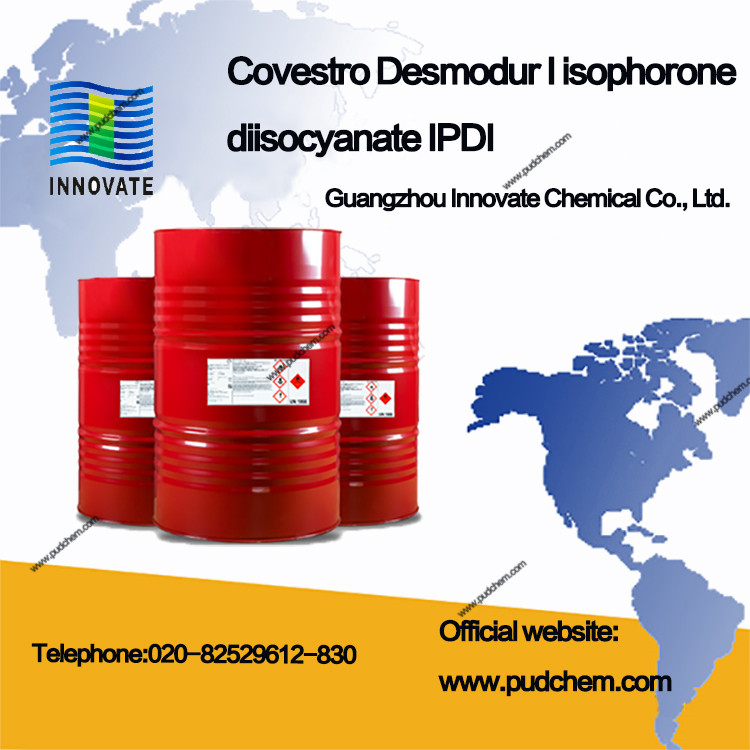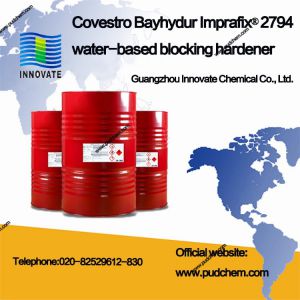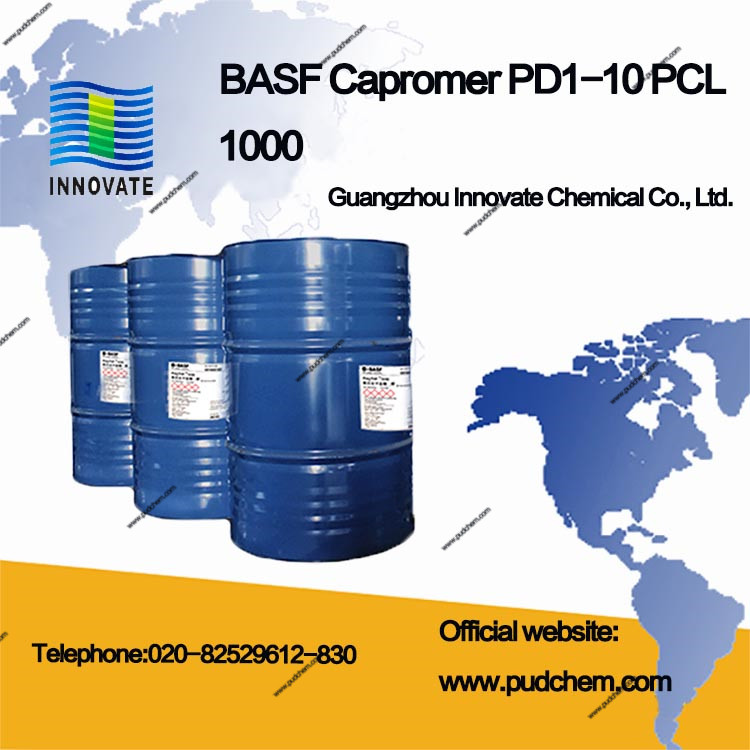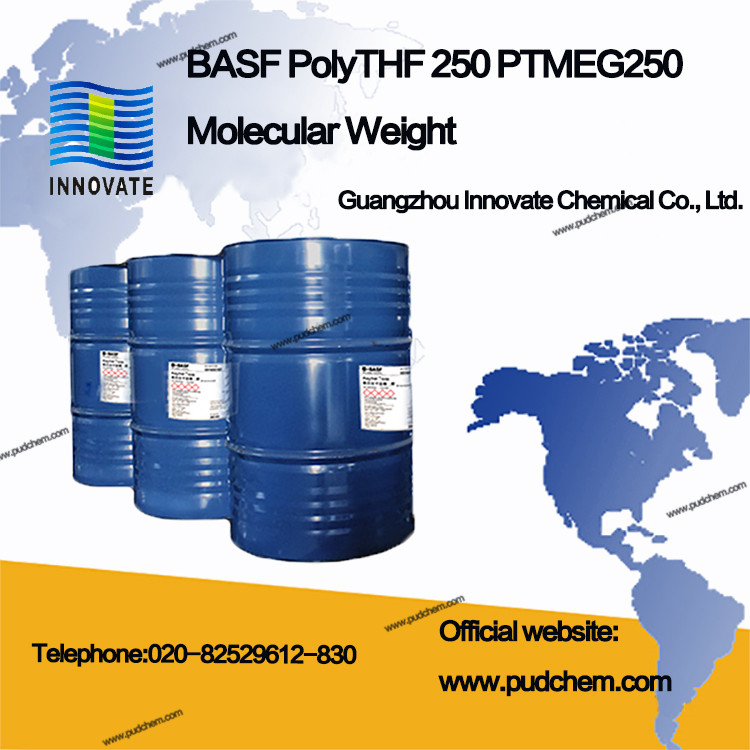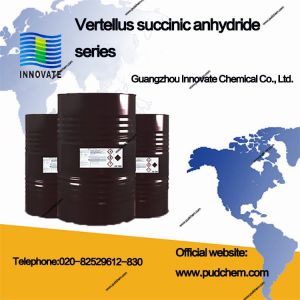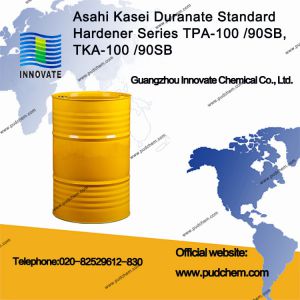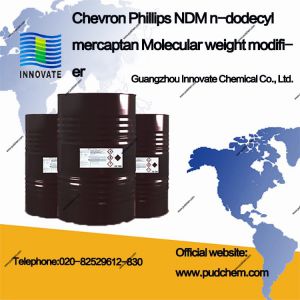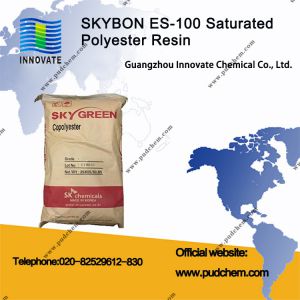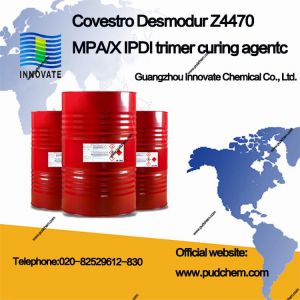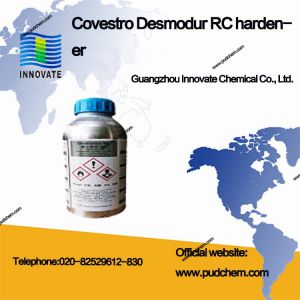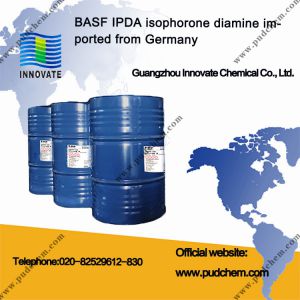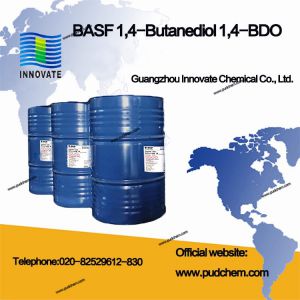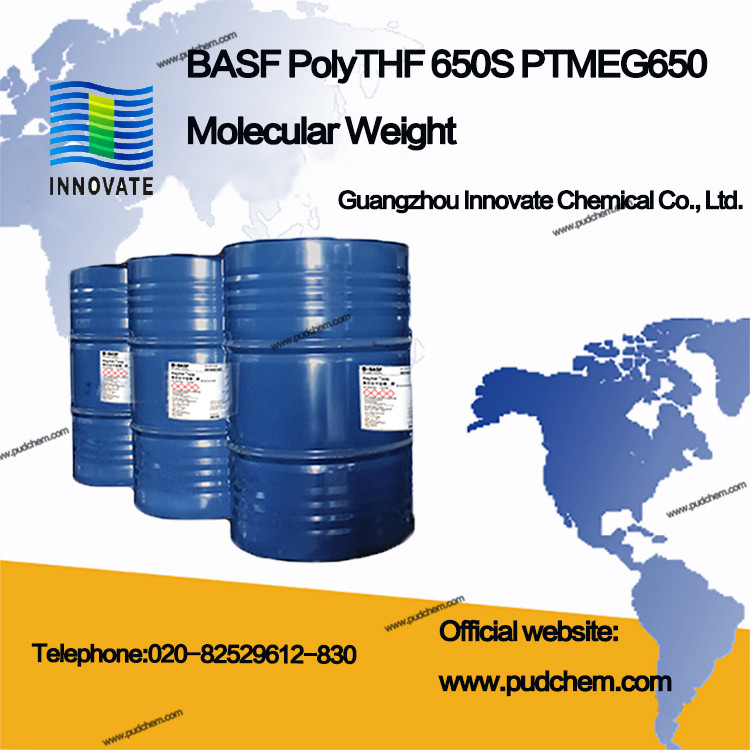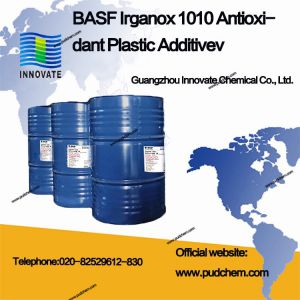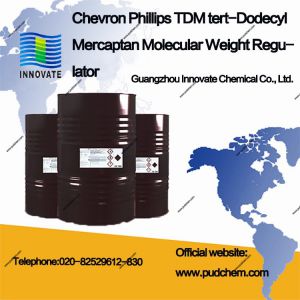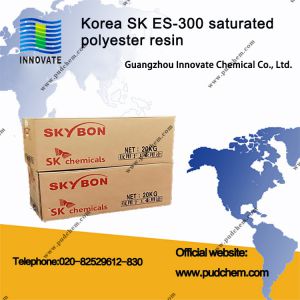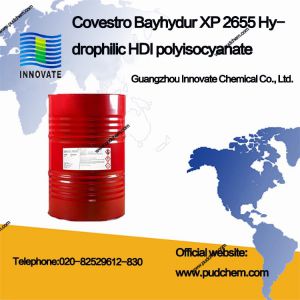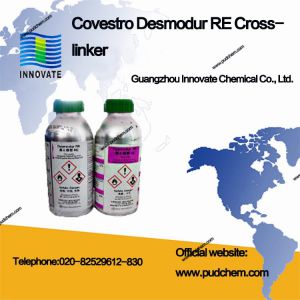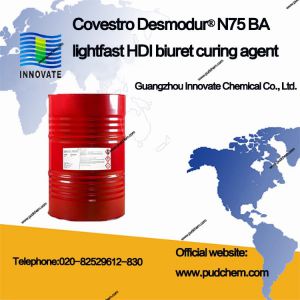Vertellus Polycins® Castor Oil Modified Polyol D-290 T-400 M365 D1000 D2000… Bio-based Hydrolysis Resistant Heat Resistant Polyol
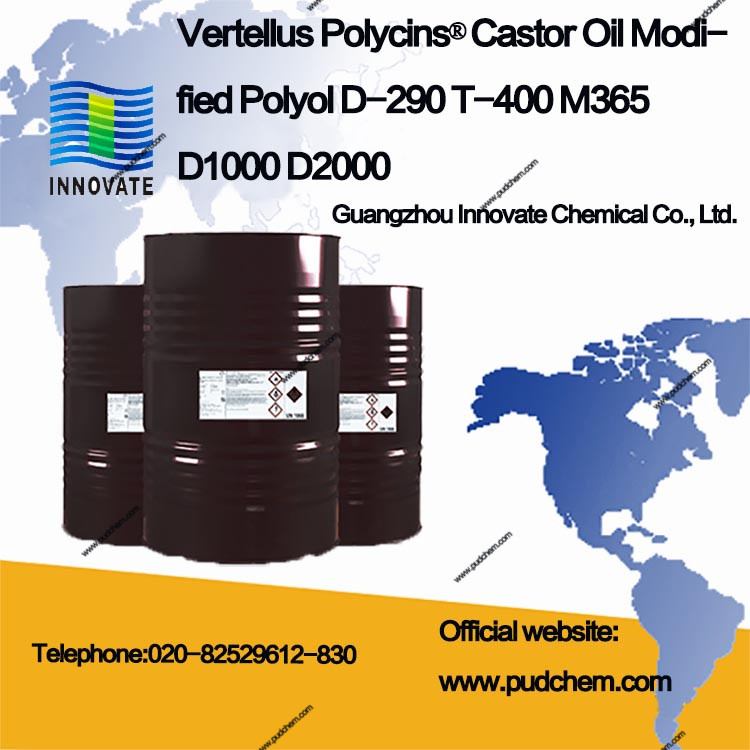
Product introduction
Ventrus Specialties offers a new line of castor oil derived, low cost, 100% solids polyurethane polyols.
These new polyols are named POLYCIN® D, T and M series. These hydroxyl-terminated ricinoleate derivatives react with standard chemical isocyanates to form urethanes for coatings, adhesives, sealants, elastomers (CASE).
Product Features
Excellent electrical properties, low vapor hazard, easy handling, low viscosity, excellent permeability, room temperature curing, anti-reversion properties, thermal stability;
Low heat release, low stress, low temperature resistance, excellent moisture retention, low cost, 100% solids content, no volatile organic compounds (VOC)
Hydrolytic stability
Polyurethane systems synthesized with POLYCINS® exhibit very good resistance to heat and humidity under any conditions. For example, systems based on POLYCINS® not only pass but also exceed the requirements of Navy avionics testing for 28 days at 95% relative humidity and 100°C.
· Low heat release
Electronic components such as toroids, reeds, mercury switches, inductors, and selenium rectifiers are sensitive to stresses caused by packaging materials, which can cause changes in performance or even damage to components. The thermal sensitivity of electronic components and the avoidance of mechanical deformation require their low exotherm. Polyurethane systems are synthesized with POLYCINS® to meet requirements for low exotherm at an average temperature of 85°F (29.4°C) above ambient.
· Minimal shrinkage
Room temperature cured POLYCIN® elastomers show little or no shrinkage. This maintains the performance integrity of the finished system or product.
· Temperature stability
Test data show that POLYCIN® elastomers have significant thermal stability. Therefore, they guarantee a wide operating temperature range with a maximum interval temperature of 150°C.
· Chemical and solvent resistance
The volume resistivity of the POLYCIN® system did not change after 6 months of exposure to seawater. The POLYCIN® Elastomers were immersed in 10% hydrochloric acid and sodium hydroxide solutions for 7 days respectively, completely unaffected.
The POLYCIN® system has excellent solvent resistance to aliphatic products (petroleum, heptane) and hydroxyl-containing materials (ethylene glycol). After 7 days of immersion at room temperature, there was little or no change in linear dimensions. However, when using an aromatic solvent (xylene), an oxygenated solvent (acetone), and a chlorinated solvent (tetrachloroethylene), there may be some linear expansion after standing at room temperature for 3 hours.
· Reactive diluents
In polyurethane resin systems, POLYCINS® provides an excellent means of reducing volatile organic compounds (VOCs) and reducing viscosity. At the same time, it also has performance in improving hardness, elasticity, gloss, fluidity and wetness.
Security and Handling
POLYCINS® is non-toxic, biodegradable, and produced from renewable resources. Under normal storage conditions, its shelf life is at least two years.
physical properties
|
Typical performance |
DB®Oil |
D-120 |
||||
|
Viscosity@25℃, cP |
720 |
490 |
650 |
370 |
280 |
1,500 |
|
color, Gardner |
2 |
3 |
2 |
2 |
3 |
3 |
|
Acidity |
0.8 |
3 |
1 |
2 |
3 |
1 |
|
Hydroxyl value |
164 |
125 |
140 |
265 |
290 |
400 |
|
equivalent |
342 |
450 |
400 |
212 |
193 |
141 |
|
Specific Gravity@25℃ |
0.959 |
0.940 |
0.957 |
0.968 |
0.960 |
0,996 |
|
Density, lbs/gal |
7.98 |
7.82 |
7.96 |
8.05 |
7.99 |
8.29 |
|
Moisture, % |
0.02 |
0.02 |
0.02 |
0.02 |
0.02 |
0.02 |
|
functionality |
2.7 |
2 |
2 |
2 |
2 |
3 |
|
Typical performance |
D3000 |
D4000 |
||||
|
Viscosity@25℃, cP |
1,250 |
2,000 |
300 |
1,360 |
3,860 |
8,600 |
|
color, Gardner |
3 |
3 |
4 |
7 |
8 |
11 |
|
Acidity |
1 |
1 |
3 |
3 |
3 |
3 |
|
Hydroxyl value |
280 |
365 |
123 |
54 |
38 |
28 |
|
equivalent |
200 |
154 |
456 |
1039 |
1476 |
2004 |
|
Specific Gravity@25℃ |
0.990 |
1.02 |
- |
- |
- |
- |
|
Density, lbs/gal |
8.24 |
8.49 |
- |
- |
- |
- |
|
Moisture, % |
0.02 |
0.02 |
0.01 |
0.01 |
0.01 |
0.01 |
|
functionality |
4 |
4+ |
2 |
2 |
2 |
2 |
Coating properties
|
physical test |
DB®0il |
D-120 |
D-140 |
D-265 |
D-290 |
T-400 |
M-280 |
M-365 |
|
7 days pencil hardness |
2B |
— |
HB |
2B |
HB |
H |
HB |
HB |
|
Direct shock, 140 lbs |
pass |
— |
pass |
pass |
pass |
pass |
pass |
pass |
|
Reverse shock, 140 lbs |
pass |
— |
pass |
pass |
pass |
pass |
120 |
pass |
|
200 butanone rubbed twice |
pass |
— |
pass |
pass |
pass |
pass |
pass |
pass |
|
Sodium hydroxide 50% |
P |
— |
P |
P |
P |
P |
P |
P |
|
Toluene |
F |
— |
P |
P |
P |
P |
P |
P |
|
acetic acid |
F |
— |
F |
F |
F |
F |
F |
F |
|
brake fluid |
F |
— |
P |
P |
F |
P |
P |
P |
|
water |
P |
— |
P |
P |
P |
P |
P |
P |
Note: NCO:OH=1.05:1.0HDT P=Pass F=Fail
Adhesive, Sealant and Elastomer (ASE) Properties
|
physical test |
DB®0il |
D-120 |
D-140 |
D-265 |
D-290 |
T-400 |
|
Shore A hardness |
75 |
41 |
45 |
100 |
100 |
100 |
|
Shore D hardness |
25 |
— |
14 |
70 |
74 |
81 |
|
stretch, psi |
495 |
113 |
225 |
3200 |
4650 |
7600 |
|
Elongation, % |
80 |
60 |
185 |
135 |
200 |
15 |
|
physical test |
M-280 |
M-365 |
D1000 |
D2000 |
D3000 |
D4000 |
|
Shore A hardness |
100 |
100 |
42 |
16 |
16 |
15 |
|
Shore D hardness |
77 |
82 |
|
|
|
|
|
stretch, psi |
5750 |
8100 |
150 |
40 |
39 |
43 |
|
Elongation, % |
20 |
10 |
70 |
75 |
70 |
65 |
Note: MDI is cured at NCO/OH=1.05/1.0
c
- PREV:Chevron Phillips NDM n-dodecyl mercaptan Molecular weight modifier
- NEXT:SKYBON ES-100 Saturated Polyester Resin

